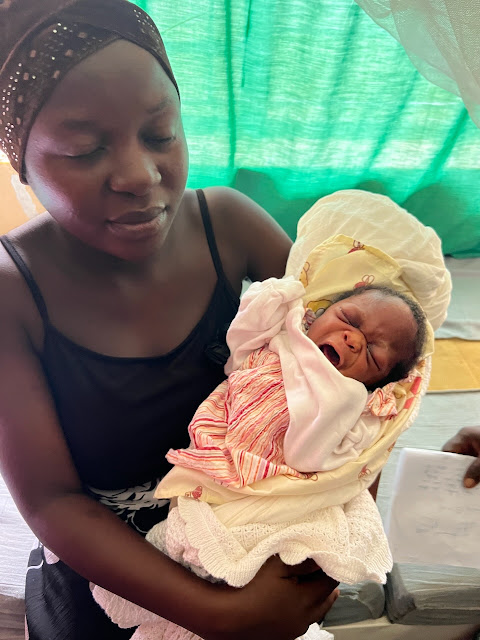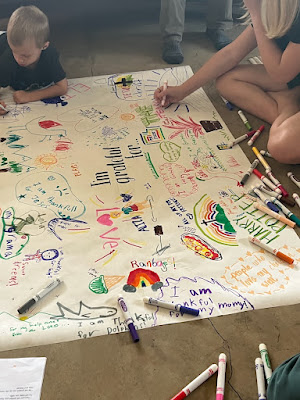A week ago we pulled out of our gate in the early morning, to drive across Uganda through rainy season profligate green to the international airport. . . and this morning we drove out of Lilongwe, capital of Malawi, to their international airport to head back, past dusty plowed thirsty fields. Out of rainy season into dry season and back again. The rains on our continent make the same north to south sweep this time of year.
Rainy Uganda above, to dry Malawi below

.jpeg)
Over 100 years ago, Scottish presbyterians and South Africa Dutch Reformed missionaries followed the call and example of David Livingstone into the interior, and an innovative risk-taking Malawian leader in Nkhoma saw that these Europeans had guns, and decided to invite them to his area. His tribe could handle wild animals and vagaries of climate, but he thought the firepower would be very useful in protecting his people from hostile neighbouring tribes who also took captives to sell to coastal slavers from abroad. The missionaries noted that Nkhoma, at over 4000 feet, provided a healthier less malarious climate for survival than the lower lakeshore. So they accepted the invitation. Still, at the end of the first year, the tensions of cross-cultural collaboration and suspicion were high. On Nov 27, 1889 a crowd surrounded Rev. Murray. The rains were desperately needed and late. If he really had a connection to God, he should pray for the rain. They gave the missionaries 24 hours, until sunset on the 28th . . . and if no rains had come, they would take that as a sign that these foreigners displeased the spirits and should be sacrificed. Those men prayed, and prayed some more, through the night of the 27th and day of the 28th.
A half hour before sunset, the skies opened and rain poured down.
And so lives were spared and land was granted to the church to begin a collaboration that translated the Bible, built numerous schools and churches, and established a hospital and nursing school and teachers’ college and eventually a University. The synod leaders over the decades transitioned from foreigners to Malawians, as did most of the church, school, and hospital staff. Family after family came and went from various corners of the country and the globe, moving into the solid brick houses with their tropical verandas and tenuous water systems. Thousands and thousands of treatments and surgeries and lessons and projects later, here we are in 2022. So much good. And yet, Malawi remains, like most of this continent, near the basement of any development index. The Kingdom comes, but in the slow way that a mustard seed grows, good but not enough for twenty million people the thrive. Yet.
A bit like the old missionaries, were were responding to invitation and going to establish collaboration, though this time we pray with less colonial hubris and certainly no firearms, but the ongoing heart to bless our neighbours.


Arrival photos, Daniel and Bethany in front of their house
A year ago the Robbins family moved to Malawi. They had served a short term in the area as school teachers shortly after their marriage over a decade ago, and after finishing graduate training and working in the USA and having three kids then joining Serge and completing needed PhD coursework to qualify for seminary professorship and counsellor training to engage with safe-house programs for abused kids (a lot happens in a decade). . . they were ready to move to Nkhoma. We had intended to make a respectful visit as Serge leaders pre-move to Nkhoma in 2020 but . . Covid . . then when travel eased a little in 2021 but . . . injury . . . so this trip was long overdue. Though many others have served and lived in Nkhoma over the years, we don’t assume our welcome or right to insert ourselves. We need the clarity of the synod leadership inviting us organisationally, and so we primarily went to sign an “MOU” (memorandum of understanding) together (THANKS to advance work by the Brotherton-Streets).


With Rev. Vasco in his office for the signing
This is the Area Director side of our job, and quite delightful. The primary meeting was fun for sure, Malawians have a warm humour, and Rev. Vasco graciously signed with Scott while saying : yes, now we have the papers, but more importantly we already have the trust with Daniel and Bethany. They have worked hard, and God’s abundant grace at the fray, has enabled them to already establish relational connection that is more important than any document. And that’s the real joy of such a visit, not accomplishing paperwork but witnessing redemption. Getting a front row view of the Robbins and others as they grapple with poverty and broken systems and find the places where their particular resins can seal the cracks.
Because in our era, even a century on, there is still work to be done. Daniel teaches in the seminary faculty of the University, which invests in deep theological training over 4-5 years so that church leaders fan out over the country with not only a degree but a spiritual resilience, and also invests in broader diploma-level 2-3 year enrolments so that secondary schools receive teachers with competence. Bethany not only homeschools her kids (and she’s one of those dream homeschoolers who uses the flexibility to stimulate creative, problem solving, real thought about the way the world works) but also mentors counsellors locally and at distance, particularly those working in the hardest heartbreaking areas of abusive trauma in childhood. Non-Serge missionaries are also on station, establishing family medicine and surgical residency training, providing medical care to the marginalised. We toured the hospital and met with some of the doctors and professors and pastors and friends.

We loved being students again for a morning's dive into a Scripture passage as Professor Robbins drew out observations and analysis, then challenged us to examine trinitarian relationships in the context of voluntary submission. . . significant for understanding God but also human relationships. Wow.

Our role as outsiders now is to come alongside people who are the primary sealers of the broken pieces, people who were born and raised here. Like Rev. M who is preparing a thesis examining the Hebrew concept of “anavim”, a word in the Psalms that comfortable people assume to mean internal moral poverty . . . but perhaps the people who wrote it in ancient Palestine and the people who read it in 2022 Malawi see a richer (and more accurate) both-and meaning of spiritual and physical, internal and external need. Or Professor H who is juggling the finances and administration of the entire University while raising his family, or his wife E who brings quality improvement projects into the nursing care at the hospital. These people and their children are the future of Malawi, and yet God continually sprinkles in people from afar too. People who have benefited from a life that allowed for development of their skills and passions and who are now willing to be the seed of similar blessing and training in a new location, people who have access to tell the stories and channel the resources which are not fairly distributed in our world.

H, his son, M, and Robbins fam having stimulating discussions over fruit and eggs from M's chickens
That’s why we are in Malawi, new to Serge though not new to the centuries of Africans who have laboured and lived and loved here. To listen to statistics and witness the reality that Malawians endure. To willingly encounter the sorrows that harm so that we can be a tiny drop of the grace God rains down.

On our final evening last night, I walked out on the porch to sit and read as the light faded, a moment of rest before our early morning return flight. It was about half an hour before sunset again, in mid-November, and the parched heat of dry season radiated back up from the dusty floor as it does after months of sun and wind. Gradually I noticed an unfamiliar sound and sensation.
Raindrops.
The tentative beginning of the annual deluge had arrived.
PS The team would love to have more help. Priorities are seminary professors and family medicine doctors, or nursing professors or teachers or counsellors. . . . mostly people with the humility to listen to and learn from our partners, and the faith to try new things in hard places.
We can testify it's a fun crowd to spend a birthday with!
Nkhoma mountain, Malawi. May God's Kingdom come here in all it's healing, refreshing beauty.









.jpeg)




.jpeg)









